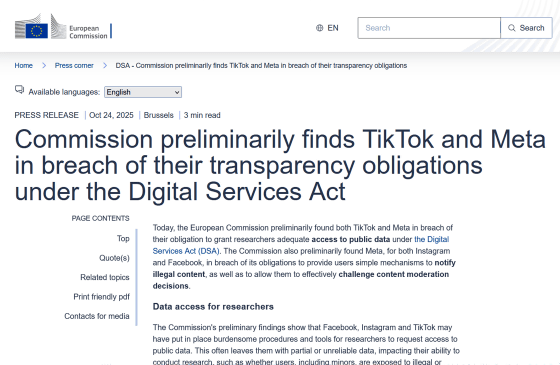Meta and TikTok are blocking data access to study how SNS spreads misinformation and influences elections

In recent years, there have been concerns about the spread of misinformation and hate speech on social media, and the resulting impact on politics and elections. Researchers are conducting research focusing on communication and speech on social media. Meanwhile, the European Commission (EC) has found that TikTok and Meta are in breach of the 'obligation to grant researchers appropriate access to public data' under the Digital Services Act (DSA) .
DSA - Commission preliminarily finds TikTok and Meta in breach of their transparency obligations
https://ec.europa.eu/commission/presscorner/detail/en/ip_25_2503

Meta and TikTok are obstructing researchers' access to data, European Commission rules | Science | AAAS
https://www.science.org/content/article/meta-and-tiktok-are-obstructing-researchers-access-data-european-commission-rules
In 2024, Philipp Lorenz-Sprehn, a computational social scientist at the Dresden University of Technology in Germany, set out to study how European politicians communicate online and how divisive their language is.
Lorenz-Sprehn relied on the Digital Services Act, which came into effect in February 2024. The Digital Services Act was introduced by the European Commission with the aims of 'creating a safer digital space' and 'establishing a level playing field to foster innovation, growth and competition both in the European market and globally,' and it imposes various obligations on large online platforms and search engines.
The obligations imposed on companies under the Digital Services Act include 'strengthening user rights,' 'stronger protection of minors,' 'more rigorous moderation and reduction of misinformation,' and 'increasing transparency and accountability.' Companies subject to the Digital Services Act are required to provide researchers with access to publicly available data upon request.
European Commission announces large-scale platforms subject to 'Digital Services Act' including YouTube, Google, Twitter, Instagram, Facebook, TikTok, Wikipedia, and more - GIGAZINE

Therefore, Lorenz-Sprehn should have been able to obtain the data he needed simply by making a request to companies like X, TikTok, and Meta. However, X repeatedly questioned Lorenz-Sprehn, ultimately denying his request without giving any explanation. While TikTok did provide access, other researchers have pointed out that the data it provides is 'seriously flawed.'
Furthermore, Meta, the company that owns Facebook and Instagram, only provided researchers with a dashboard with severe limitations, such as only being able to access data from accounts with more than 25,000 followers, making it impossible to investigate some European politicians.
In response to these issues, the European Commission launched an investigation, announcing in a statement on October 24, 2025, 'The European Commission has today provisionally determined that both TikTok and Meta have violated their obligations under the Digital Services Act (DSA) to grant researchers appropriate access to public data.'
In July 2024, the EC warned X that it had failed to provide transparency and accountability regarding content moderation and advertising, thereby violating the Digital Services Act. The EC's investigation is still ongoing at the time of writing.
European Commission warns that X (formerly Twitter)'s blue checkmark is misleading users, and could face a fine of 6% of total turnover - GIGAZINE

The move has been hailed as a sign that the EC is serious about enforcing the Digital Services Act. 'Access to data for researchers is a crucial element in ensuring transparency and democratic accountability. Citizens have a right to know how platforms and their algorithms affect the information society,' said Steven Lewandowski, a psychologist at the Dresden University of Technology.
If the EC finds that these companies are in violation of the Digital Services Act, it can impose fines of up to $1 billion (approximately 150 billion yen) on each company, but the companies will be given an opportunity to defend themselves before doing so. A Meta spokesperson stated in an email to Science that the company has already taken the necessary steps to comply with the Digital Services Act. A TikTok spokesperson said the company is reviewing the EC's findings but pointed out that the Digital Services Act's data-sharing requirements are inconsistent with EU privacy regulations.
Data held by major technology companies is essential for studying the spread of misinformation, hoaxes, incitement, and hate speech related to elections and politics on social media. However, researchers who have used the Digital Services Act to request data have complained that platforms use multiple methods to delay or refuse to hand over the data. For example, while X has a very simple online application form, it is not immediately approved; instead, it is rejected after several dozen days, or users are sent through a loop of repeatedly asking questions that are unclear in their answers.
On 29 October 2025, the Digital Services Act will further broaden the scope of data that can be requested from platforms, allowing them to request non-public data. This is likely to provoke resistance from platforms, but it also provides an opportunity for researchers to gain a deeper understanding of how platforms actually work.
For example, research has shown that content that provokes user anger receives more 'likes,' but this could be the result of platform manipulation. 'The question always remains: is this a function of people's psychology, and do they simply prefer that type of content, or are the platforms somehow imposing it on them? This is exactly the kind of data we need if we want to make real progress in this area,' Lorenz-Sprehn said.
Related Posts:
in Web Service, Posted by log1h_ik







